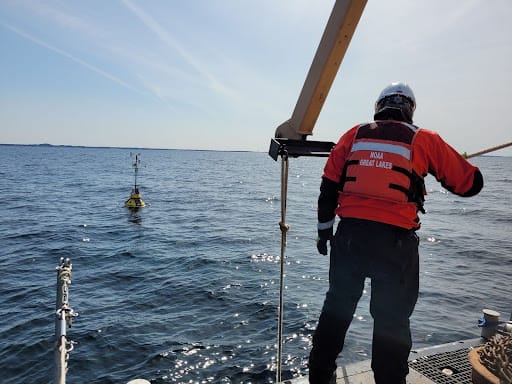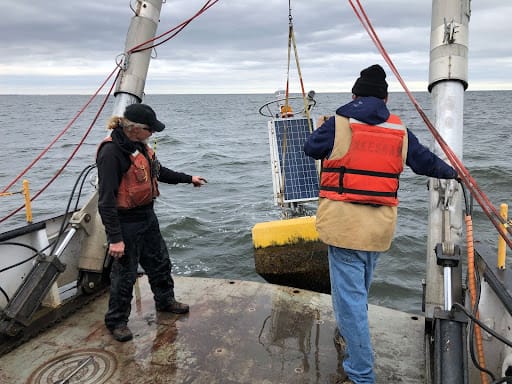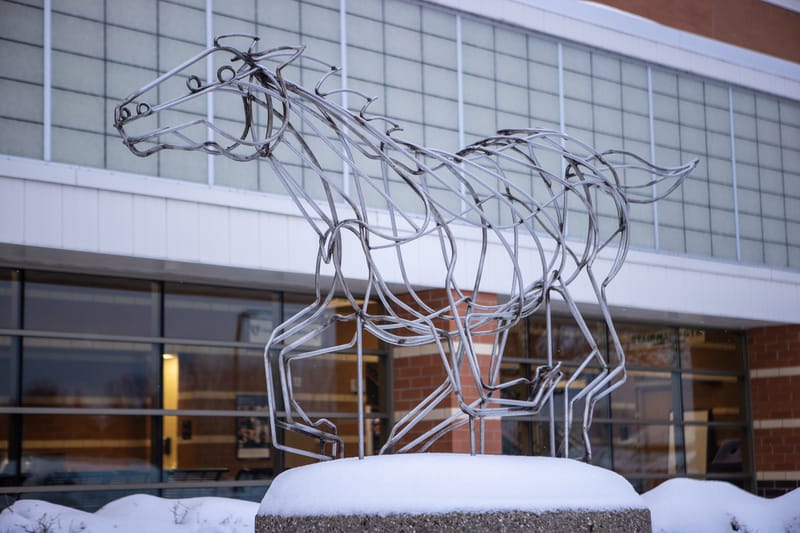Trump Administration's planned budget cuts threaten key Lake Michigan data network
Proposed federal budget cuts to the National Oceanic and Atmospheric Administration could pull the plug on a vital data network for Lake Michigan, impacting everything from boater safety and fishing forecasts to beach monitoring and drinking water intakes.

WEST MICHIGAN — Proposed federal budget cuts to the National Oceanic and Atmospheric Administration could pull the plug on a vital data network for Lake Michigan, impacting everything from boater safety and fishing forecasts to beach monitoring and drinking water intakes.
The Great Lakes Observing System, which supports the management of over 77 buoys, meteorological towers, and high-frequency radar units specifically on Lake Michigan, faces a potential shutdown of its real-time data collection if proposed cuts of roughly $1.6 billion to NOAA in the fiscal year 2026 Trump Administration budget go through.
This network provides continuous, real-time information on critical conditions such as wind speed, air temperature, wave height, water temperature at various depths, and water-quality parameters. This data, freely accessible to the public on GLOS’ data platform Seagull and other apps, is essential for a wide range of users.
"If the funding cuts zero out costs, we know a number of buoys won't be going out on the water," said Shelby Brunner, Science and Observations Manager for GLOS. "We would have to fundraise and see how to support them. There could be a number of downstream effects that we don't really know."
Safety and recreation at risk
The real-time data is crucial for recreational boaters and commercial freighters navigating Lake Michigan, helping them make safe and efficient decisions based on up-to-the-minute conditions.
A seemingly small difference between a 1.5-foot wave and a 4-foot wave can be critical for vessel safety. The information also aids the National Weather Service in refining regional forecasts based on actual, localized conditions.
"It can make a big difference on the safety piece," Brunner said. "Being able to deliver that data helps marinas and harbors improve the experience for their guests and safety."
The U.S. Coast Guard also utilizes this information in search and rescue operations.
Recreational activities like fishing and swimming also heavily rely on GLOS data. Charter fishermen use water temperature profiles to strategically locate fish, while the network monitors for harmful algal blooms and E. coli outbreaks that can close beaches and threaten water supplies. GLOS data supports the water treatment plant in Green Bay, Wisconsin, for example.
Lake Michigan's high recreational use makes this real-time monitoring particularly important. The lake is among the most popular boating destinations in the Great Lakes.

Environmental monitoring in jeopardy
The potential loss of GLOS funding would also severely hamper the ability to monitor and respond to environmental emergencies.
The total amount of money at risk for GLOS core operations in fiscal year 2025 is $2.3 million, with an additional $3 million for equipment upgrades also being held back. The proposed federal cuts raise serious concerns about the future of this critical data network and its ability to serve the millions who rely on Lake Michigan.
High-frequency radars located at the Straits of Mackinac, a vital waterway connecting Lake Michigan and Lake Huron, provide detailed information on water movement. This is critical for tracking the potential spread of oil spills, allowing coastal managers to take timely action to protect beaches and water intakes.
"If there is an oil spill, we want to know which way it's going and tell coastal managers to close beaches and try to mitigate and contain the oil the best we can," Brunner said. "The high-frequency data may not be available or may not have anyone to maintain it. If anything happens, we don't get that chance back. You can't just undo."
Impact on research, long-term understanding
The GLOS network in Lake Michigan also supports numerous long-term research projects in partnership with academic institutions.
Buoys deployed by researchers contribute to understanding the lake's complex ecosystem, including water quality, fish populations, and the impacts of invasive species like zebra mussels, which have dramatically altered the lake's ecology. Continuous monitoring helps track these changes and maintain crucial baseline data.
The Ann Arbor-based Great Lakes Environmental Research Laboratory, a key data partner of GLOS, also faces potential disruptions due to the proposed cuts. GLERL conducts extensive research on Lake Michigan and operates research vessels essential for data collection. Loss of funding or a change in GLERL's focus could significantly impact research and monitoring efforts on the lake.
Broader regional implications
The data collected by GLOS on Lake Michigan is also interconnected with broader monitoring efforts across the Great Lakes region, providing valuable context for understanding nutrient loading and watershed changes that can impact the lake.
The potential shutdown of the network would not only affect Lake Michigan but could also have ripple effects across the entire Great Lakes ecosystem.
Please consider becoming a monthly donor!
"If we experience a loss of funding for GLOS, we anticipate decreased certainty of safety and decision-making data for everyone from the hundreds of thousands of tourists to the businesses who live there, to the maritime economy — fishing and charter fishermen," Brunner said. "The information we provide benefits everyone and has wide-reaching implications around safety, economy and water quality."
As the Great Lakes regional association for the Integrated Ocean Observing System, GLOS serves as the central hub for data and information in the region.
Although officially recognized, GLOS heavily depends on a wide network of partners — including municipalities, universities, research groups, and businesses — who manage and deploy their own observing assets, some with GLOS's financial or procurement support.
— Heather VanDyke covers northern Ottawa County for the Ottawa News Network. Contact her at newsroom@ottawanewsnetwork.org.




